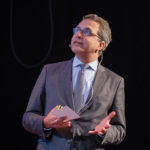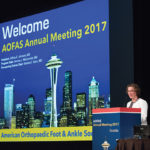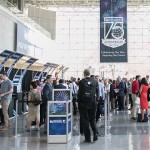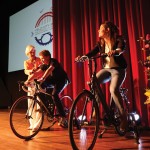Meeting
The largest gathering of urologists and allied professionals in the world, the AUA Annual Meeting emphasizes research and education, with a special focus on cutting-edge advances.
Challenges
Indeed, when we spoke to Janet Skorepa, AUA’s associate executive director of education and scientific meetings, for an advance profile of the meeting, she said that one of her biggest challenges was making sure her programming was up-to-the-minute on “what’s new in urology.” (Read our Pre Con article at convn.org/aua-pre-con.)
Per usual, this year AUA reserved plenary-session slots for late-breaking developments in the field, and highlighted new research in a special forum. But AUA also was able to take advantage of breaking news in the mainstream media when the U.S. Preventive Services Task Force released its final recommendations on prostate-cancer screening during the meeting. “This allowed us to take extremely relevant research to entirely new heights,” Skorepa said, “and drew national attention to our meeting, which had in attendance the world’s leading experts on prostate cancer.”
Not that Skorepa and her team were strictly reactive. They’d planned a number of new programs this year, including the AUA National Residents Bowl, which “matched residents in an ultimate battle of the brains,” Skorepa said. Each of AUA’s eight member sections fielded a four person team, who answered questions about urological subspecialties, the history of urology, and major research. “This spirited event,” Skorepa said, “attracted several hundred in attendance who rooted for their sections.”
Another new item on the agenda: an entire day of live surgeries, with seven procedures scheduled to be broadcast to the GWCC from around the world. Because of a “last-minute issue,” one of the surgeries was switched to a prerecorded procedure, but otherwise, Skorepa said, “all went very well, with a good bit of moderator/audience Q&A.”
The 2012 Annual Meeting also introduced a half-day program for advance practice nurses (APNs) and physician assistants (PAs), “to increase awareness among allied health-care professionals of current AUA guidelines for common urological problems,” Skorepa said. “The program included interactive audience participation with case-based learning using an audience-response system. The program was very well received by the APN/PA community, and work has begun on next year’s program.”
And AUA presented a research program on “The Science of Male Health” in conjunction with the Atlanta-based U.S. Centers for Disease Control and Prevention (CDC), during which a CDC representative offered “CDC’s perspective before delving into specific male-health topics,” Skorepa said. “The AUA is committed to supporting urologic research, and this event provided a valuable opportunity for scholarly exchange.”
As did the entire Annual Meeting. “Sessions were at capacity,” Skorepa said, “and initial survey results indicate that the majority of attendees will make changes to their practices based on what they learned at the Annual Meeting.”
For more information: aua2012.org.
Convene’s Pre-Con/Post-Con series asks meeting planners about their challenges and how they intend to address them (Pre-Con), and then circles back around after the meeting has occurred (Post-Con) to see how well they worked out.




